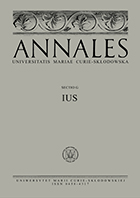Dysfunkcjonalność ochrony praw pacjenta małoletniego. Część 1: Reprezentowanie interesów i prawo do informacji
The Dysfunctionality of the Protection of the Rights of a Minor Patient. Part 1: Representation of Interests and the Right to Information
Author(s): Maria BoratyńskaSubject(s): Civil Law, Health and medicine and law
Published by: Wydawnictwo Naukowe Uniwersytetu Marii Curie-Sklodowskiej
Keywords: child as a patient; minor patient; right to information; protection of the rights of a minor patient;
Summary/Abstract: The article considers the functionality of protecting the rights of the child as a patient from abuse of parental authority and assesses the possibility of independent activity of adequately mentally mature children. In Polish medical law, the age ceiling for limited decision-making capacity in of consent to medical acts is set too high. The legislation only regulates the issue of decisional age from the side of the validity of the consent for the provision of medical service and the due medical information. Even the best parent is, after all, only a third party to the personal interests of his/her child and is not entitled to the right to exercise his/her rights as a patient. The consequences of neglecting care in matters that do not require immediate medical attention can be harmful when they result in future bodily dysfunctions, such as worsening visual impairment or dramatic dental defects. Medical law, however, does not differentiate between the rights of a minor. A highly defined decision age ceiling is dysfunctional in many respects because it does not distinguish between a newborn and a 15-year-old, whereas already school adolescents show at least a limited understanding of their own health matters health. Although the law provides for applying for the authorization of a guardianship court, this method is completely ineffective unless it is carried out by an adult. The child should be equipped with the legal means to act independently, freely, and free of to act without the involvement of protective services, at least in relatively simple and obvious matters. After a deeper analysis of the norms, it appears that the legal sanctions for medical assistance in ordinary health matters, given to a child under conditions of abuse of parental authority, can be overruled by an argument of a conflict of goods and interests.
Journal: Annales Universitatis Mariae Curie-Skłodowska, sectio G – Ius
- Issue Year: 70/2023
- Issue No: 1
- Page Range: 39-69
- Page Count: 31
- Language: Polish

